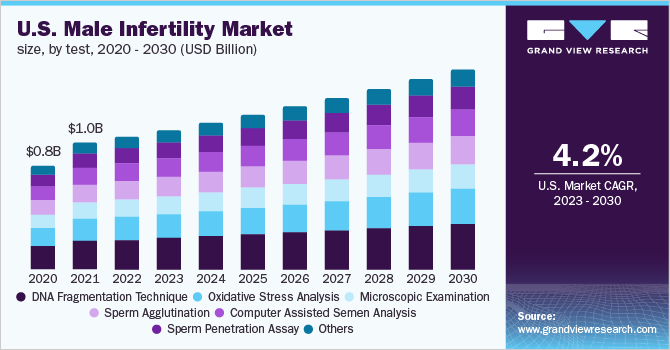The global male infertility market was valued at USD 4.0 billion in 2022 and is projected to reach USD 5.9 billion by 2030, expanding at a CAGR of 4.9% from 2023 to 2030. The market’s growth is primarily driven by rising infertility rates worldwide and the increasing adoption of assisted reproductive technologies (ARTs).
ARTs encompass a broad range of treatments for male infertility, addressing issues such as low sperm count, abnormal sperm morphology, and poor motility. These technologies offer higher success rates compared to traditional medications, making them a preferred choice for many patients. Ongoing advancements in ART are expected to further accelerate market expansion in the coming years.
Among diagnostic techniques, DNA fragmentation analysis has gained significant traction due to its ability to provide precise insights into sperm DNA integrity—a major factor contributing to male infertility. As general acceptance of these diagnostic tools grows, DNA fragmentation technology is anticipated to see steady adoption in the future.
The COVID-19 pandemic disrupted healthcare services worldwide, with non-emergency medical procedures experiencing a 50% to 60% decline depending on the region. However, demand for diagnostics, personal protective equipment, and critical medical supplies surged during the crisis.

Key Market Highlights:
- Regional Insights: Europe led the global male infertility market in 2022, accounting for 37.30% of the revenue share. This dominance is attributed to the presence of advanced fertility clinics, broader insurance coverage for infertility treatments, higher awareness levels, and greater adoption of premium treatment options.
- By Test Type: The DNA fragmentation segment held the largest revenue share of 21.77% in 2022, driven by its effectiveness in evaluating sperm DNA quality and diagnosing infertility causes accurately.
- By Treatment: The ART and varicocele surgery segment accounted for the highest market share at 70.78% in 2022. Hormonal therapies aimed at enhancing spermatogenesis—particularly among men with low sperm counts—remain a widely used approach to achieve natural pregnancy.
Order a free sample PDF of the Male Infertility Market Intelligence Study, published by Grand View Research.
Market Size & Forecast
- 2022 Market Size: USD 4.0 Billion
- 2030 Projected Market Size: USD 5.9 Billion
- CAGR (2023-2030): 4.9%
- Europe: Largest market in 2022
- Asia Pacific: Fastest growing market
Key Companies & Market Share Insights
The market is highly competitive, necessitating strategic approaches from players. Companies are focusing on developing innovative diagnostic and treatment technologies, pursuing acquisitions, and forming partnerships or collaborations to develop and commercialize products. For example, in November 2017, Aytu BioScience gained approval from the Australian Therapeutic Goods Administration (TGA) for its MiOXSYS system, designed to assess semen quality.
Furthermore, securing certifications from regulatory bodies is crucial for strengthening market positions. A case in point is Cadila Pharmaceuticals, which received Good Laboratory Practices (GLP) Certification from India's National GLP Compliance Monitoring Authority (NGCMA) in May 2019 for its Dholka facility. This certification not only makes the company GLP compliant but also ensures recognition of its research work across all OECD member countries.
Key Players
- Bayer Healthcare
- Andrology Solutions
- Aytu BioScience, Inc.
- Cadila Healthcare Ltd.
- Halotech DNA SL
- EMD Sereno, Inc.
- SCSA Diagnostics, Inc.
- Intas Pharmaceuticals Ltd.
Explore Horizon Databook – The world's most expansive market intelligence platform developed by Grand View Research.
Conclusion
The global male infertility market is expanding due to rising infertility rates and increasing adoption of assisted reproductive technologies (ARTs). Advancements in ART, particularly DNA fragmentation analysis, are key growth drivers. Europe currently leads the market, with ART and varicocele surgery being the dominant treatment types. The market remains highly competitive, with companies focusing on innovation, strategic collaborations, and regulatory certifications to gain an edge.







